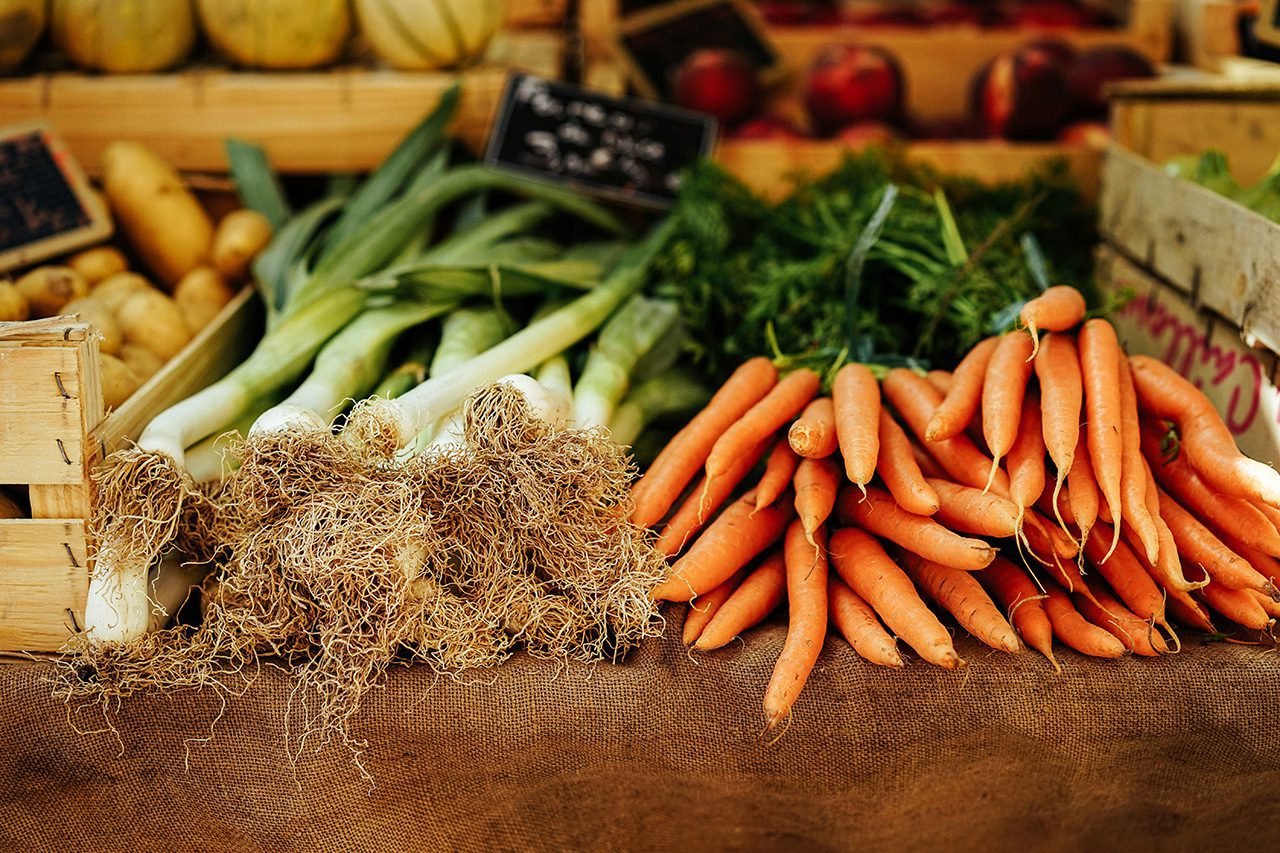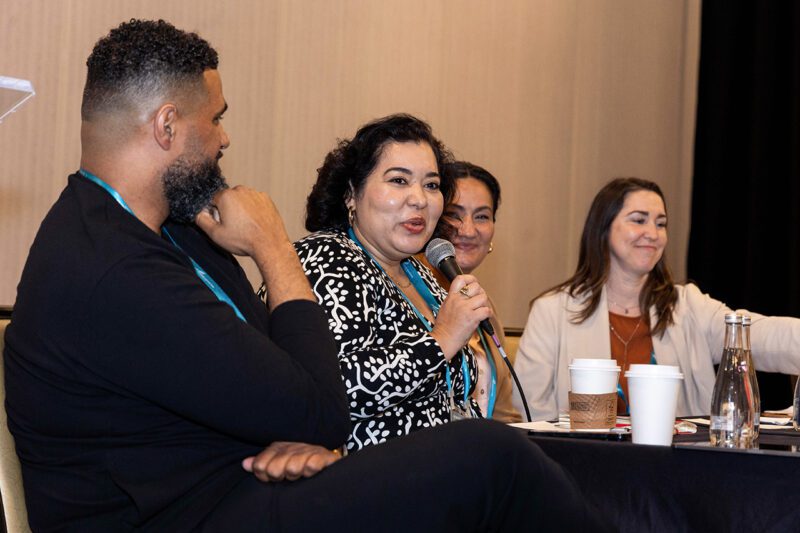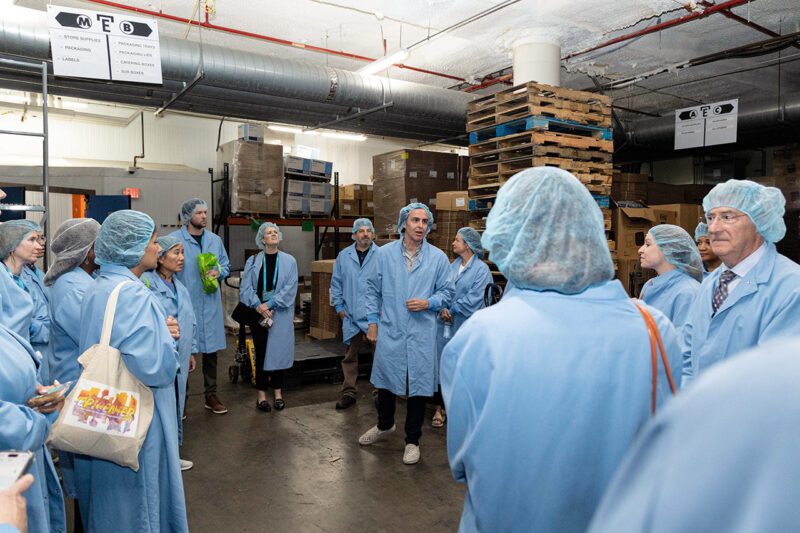Sovereign Seeds: Reclaiming MENA’s Agricultural Future
Reviving local food systems and unlocking rural prosperity

A healthy community depends on healthy food. Food access, affordability, and nutrition is interwoven into the fabric of every other social, racial, and health challenge that we are trying to solve for. How can we solve food access without understanding and changing the entire food system? This is the question that Mission Investors Exchange (MIE) posed to attendees during a food system tour at their bi-annual conference, where 750 people came to discuss mission-aligned investing and the role catalytic capital plays in addressing our biggest environmental and social challenges.
Globally, philanthropy, social entrepreneurs, governments, and NGOs are investing billions of dollars to address these challenges. Yet, too often, the problem is considered in one dimension, without fully addressing the system-wide change that needs to take place. Clare Fox, Executive Director at Sustainable Agriculture and Food Systems Funders (SAFSF) stressed how everyone is a food funder. Whether foundations or investors are funding programs to drive social equity, climate change mitigation, or gender equity, food touches all of these and needs to be considered central to solving any of the other challenges.
The food system tour organized by MIE illustrated the complex interconnections among social, racial, health, and environmental challenges. It demonstrated how blended capital can simultaneously address these issues. The tour also showcased a variety of solutions, emphasizing that a ‘one size fits all’ approach is inadequate. Furthermore, it highlighted the importance for organizations developing solutions to consider community dynamics carefully.

Noramay Cadena, Managing Partner, Supply Change Capital, speaks on the Scaling Healthy Food Access through Impact Investing panel at the Mission Investors Exchange 2024 National Conference.
“Historically, these communities have been defined as food deserts, but really it is more like food apartheid because they have been intentionally designed in a way to make it very difficult for community residents to be able to access healthy food,” stated Alba Velasquez, Executive Director for LA Food Policy Council. Residents have to travel outside of their neighborhood to be able to access healthy food options, and there is a high density of fast-food options, which contributes to unhealthy lifestyles. Since COVID, there has been an active disinvestment in low-income communities of color, with traditional grocery stores closing and not coming back. Limited grocery store options mean residents in lower income areas have less options for a healthy diet.
One way that the LA Food Policy Council is trying to address this disparity is by incentivizing existing retailers to offer healthy options. Through the Healthy Neighborhood Market program, small neighborhood markets receive training, guidance, and upgrades to their stores, allowing them to fill this market gap and providing communities with more options for a healthy lifestyle.
Historically, these communities have been defined as food deserts, but really it is more like food apartheid.
Recognizing that the challenges will require multiple stakeholders, the food systems tour took participants through a journey of downtown Los Angeles to the headquarters of Everytable, a social venture with a mission of making healthy food as affordable and accessible as fast food, while simultaneously working to close the gap on economic empowerment.
Sam Polk, CEO and co-founder of Everytable, explained their approach to integrating a food system model into their business strategy. Everytable seeks to revolutionize the fast-food industry by offering fresh, scratch-made meals that are more affordable than traditional fast food. This is achieved through a relentless focus on efficiency and the elimination of waste. Emphasizing a lean manufacturing approach, Polk noted, “Inventory signifies waste. Our primary focus is on flow—ensuring that from the moment ingredients are released from our core facility, they are quickly prepared and sent out.” Instead of operating kitchens in each store, Everytable prepares all its meals in a central kitchen located in Vernon, where they produce 20,000 meals per week for their 38 outlets. Opening a traditional restaurant can cost millions, but Everytable manages to open new retail outlets for just $300,000. By foregoing individual restaurant kitchens and opting for smaller retail spaces, they significantly reduce both initial and ongoing operational costs. This strategy supports their social equity franchise model, making it economically viable.

Everytable Founder and CEO Sam Polk leads an Impact in Action tour at the Everytable kitchen facility with Mission Investors Exchange 2024 National Conference attendees.
Building economic wealth is crucial for improving health outcomes and achieving food justice. Everytable recognizes that the communities they serve include many talented but under-capitalized entrepreneurs. To support local ownership, Everytable focuses on hiring and franchising to entrepreneurs from marginalized backgrounds who typically lack the resources to own a franchise. They offer on-the-job and leadership training, as well as capital and support, to foster economic empowerment and build generational wealth. This approach is bolstered by funding from multiple foundations and utilizes blended finance to increase capital accessibility, thereby creating a sustainable path to business ownership within marginalized communities.
Velasquez emphasizes that Los Angeles is a vibrant hub of innovation and opportunity. She points out that many effective solutions for local issues already exist; the key is to empower the right communities to participate in these solutions. Velasquez argues that there is no “one-size-fits-all” method. She stresses the importance for impact investors to provide support and resources to community residents who are actively driving these solutions. By doing so, they can help scale change and foster a more comprehensive and sustainable food system.

After participating in the food systems tour, this reporter gained a deeper understanding of the complex issue, which demands a multi-layered investment strategy. This includes impact investing, private philanthropy, entrepreneurship, and government support to create a holistic approach. Instead of addressing individual challenges separately, a systems-wide perspective is necessary to acknowledge the connections between food and critical factors such as social, racial, and gender equity, health outcomes, environmental degradation, and climate change.
We must realize that in this context, we are all stakeholders in funding the food system.
Related Content
Comments
Deep Dives

Featuring
Clarisse Awamengwi
IE Correspondent
July 17 - 12:00 PM EST

Featuring
Russell McLeod
July 24 - 12:00 PM EST
RECENT
Editor's Picks
Webinars
News & Events
Subscribe to our newsletter to receive updates about new Magazine content and upcoming webinars, deep dives, and events.
Become a Premium Member to access the full library of webinars and deep dives, exclusive membership portal, member directory, message board, and curated live chats.
At Impact Entrepreneur, we champion fearless, independent journalism and education, spotlighting the inspiring changemakers building the Impact Economy. Diversity, equity, sustainability, and democracy face unprecedented threats from misinformation, powerful interests, and systemic inequities.
We believe a sustainable and equitable future is possible—but we can't achieve it without your help. Our independent voice depends entirely on support from changemakers like you.
Please step up today. Your donation—no matter the size—ensures we continue delivering impactful journalism and education that push boundaries and hold power accountable.
Join us in protecting what truly matters. It only takes a minute to make a real difference.
0 Comments